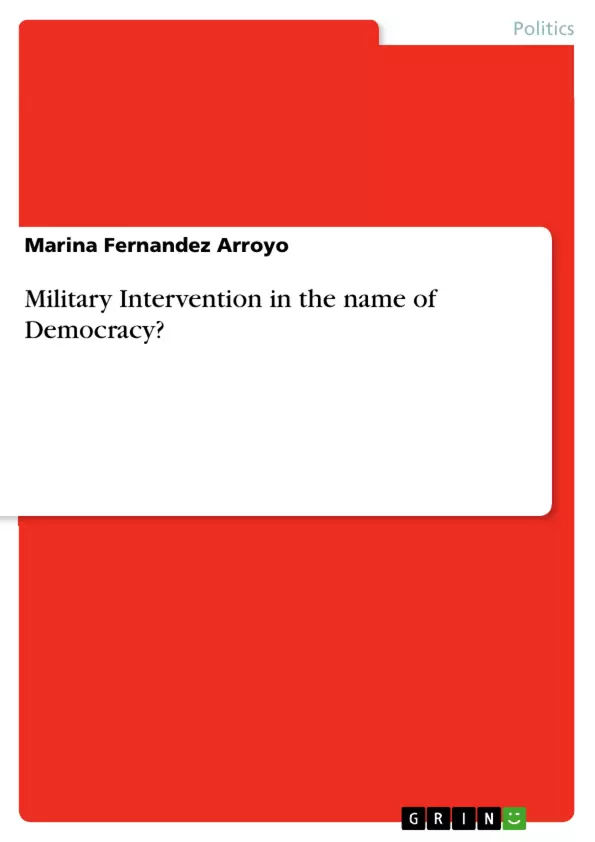President Obama acknowledged in the final State of the Union Address of his presidency last January 2016, "we should have learnt by now the lessons of Vietnam and Iraq". The country that flags itself as the land of freedom and democracy, justifies their militarily interventions abroad by reasons of US security and placement of democracy. At this point one would wonder, could democracy really be implemented through foreign military intervention?
This paper will analyse: In the first place, the legal basis established by the United Nations to consider a military intervention lawful, and the democratic mechanisms of adoption within domestic law systems to decide whether to initiate a military intervention. Secondly, the moral basis to impose democracy abroad and the criteria to choose the country that will be object of change. And finally, how successful was the implementation of democracy in countries which were dictatorial regimes such as Iraq and Afghanistan.
This paper finds that the imposition of democracy by force is not justified under international law and that imposition by force is not democratic. Meanwhile, promoting democracy is democratic and much safer. Iraq and Afghanistan are the living proof of catastrophic implementation. Besides, the justification of invading a country in order to establish democracy loses its credibility when we notice that undemocratic countries are still good allies. Domestically, it is generally the executive power that decides to wage war. This shows that there is little popular participation in such important choices.
Inhaltsverzeichnis (Table of Contents)
- Introduction
- Part 1: Legal Grounds to Justify Military Intervention
- A. International mechanisms within the United Nations Charter for the deployment of armed forces abroad
- B. Mechanisms within the domestic systems for the deployment of armed forces abroad
- Commonwealth
- United States of America
- Part 2: Motives to Impose Democracy and Results
- A. Moral Basis and Criteria to impose democracy abroad
- B. Results of the democratization process through military intervention
- Conclusion
Zielsetzung und Themenschwerpunkte (Objectives and Key Themes)
This paper explores the legal, moral, and practical implications of military interventions justified in the name of democracy, particularly in the post-Cold War era. It aims to shed light on the complex interplay of legal frameworks, political motivations, and social consequences surrounding such interventions, drawing on insights from law, politics, and sociology.
- The legal basis for military intervention under international law, specifically the United Nations Charter, and its limitations.
- The justification for imposing democracy on foreign countries and the criteria used to select target nations.
- The effectiveness of democratization through military intervention, analyzing case studies such as Iraq and Afghanistan.
- The role of domestic legal frameworks in regulating military interventions and the level of public participation in such decisions.
- The ethical considerations and potential consequences of imposing democracy through force.
Zusammenfassung der Kapitel (Chapter Summaries)
The paper begins by examining the legal frameworks governing military intervention, both internationally through the UN Charter and domestically within specific countries such as the Commonwealth and the United States. It then delves into the moral basis for imposing democracy abroad, analyzing the justifications and criteria employed. Finally, the paper examines the results of such interventions, focusing on the cases of Iraq and Afghanistan, and highlighting the challenges and complexities of implementing democracy through force.
Schlüsselwörter (Keywords)
The key themes and concepts explored in this paper include democracy, executive power, illegitimacy, military intervention, non-democratic regimes, and war.
Frequently Asked Questions
Can democracy be implemented through foreign military intervention?
This paper finds that the imposition of democracy by force is generally not successful and is often seen as illegitimate under international law. Promoting democracy through peaceful means is considered much safer and more democratic.
What are the legal grounds for military intervention according to the UN?
The United Nations Charter establishes specific mechanisms for the lawful deployment of armed forces abroad, primarily focused on international security rather than the unilateral imposition of political systems.
How successful were interventions in Iraq and Afghanistan?
The study describes the democratization processes in Iraq and Afghanistan as "catastrophic implementations," serving as proof that force is an ineffective tool for building stable democratic regimes.
Why is the moral justification for such interventions often questioned?
The credibility of invading a country to "establish democracy" is undermined when Western powers maintain strong alliances with other undemocratic regimes based on strategic interests.
Who usually decides to wage war in domestic legal systems?
In many systems, such as the US and the Commonwealth, the executive power holds the primary decision-making authority, often resulting in limited popular participation in the choice to go to war.
What is the difference between promoting and imposing democracy?
Promoting democracy involves supporting local movements and institutions, whereas imposing it involves external military force, which the paper argues is fundamentally undemocratic.
- Citation du texte
- Marina Fernandez Arroyo (Auteur), 2016, Military Intervention in the name of Democracy?, Munich, GRIN Verlag, https://www.grin.com/document/354416



